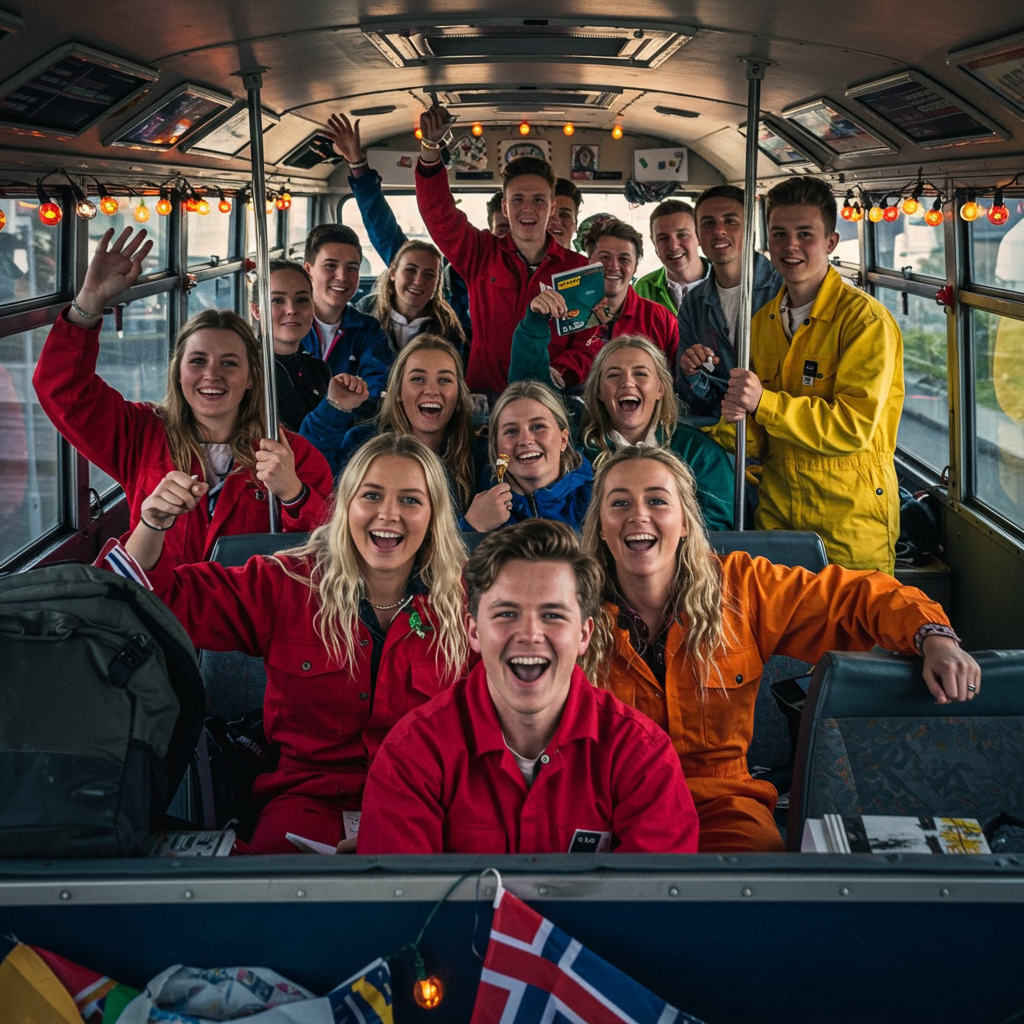For decades, Norway’s graduating students have marked the end of 13 years of school with a unique coming-of-age tradition called “russe.” Clad in colourful overalls, these school-leavers traditionally celebrated in the weeks leading up to Norway’s National Day on May 17th, a final hurrah after their exams were complete.
However, this tradition has undergone a dramatic transformation, sparking widespread debate and concern across the country. The focal point of this change? The elaborate and controversial russebuss, or party bus.
The Rise of the Russebuss Culture
What started as a tradition primarily among Oslo’s elite schools in the early 1980s has exploded into a national phenomenon. Today, for many graduating students, the russe period is dominated by weeks of non-stop partying, often beginning well before final exams are finished.
At the heart of this culture are the heavily modified buses. Equipped with booming sound systems often shipped from across Europe, these Norway party buses drive all night, from midnight until early morning, serving as mobile nightclubs. Students describe it as a month of continuous partying, drinking, and having fun with friends.
Mounting Concerns Over Cost and Impact
While participants see the buses as the ultimate graduation celebration, parents, educators, and politicians are increasingly alarmed by the negative consequences:
Academic Performance: Perhaps the most significant concern is the timing. Weeks of intense partying and sleep deprivation coincide directly with the crucial exam period. As Norway’s Minister of Education, Kari Nessa Nordtun, notes, this has been a problem for years, making it difficult for students to concentrate and contributing to declining results.
Exorbitant Costs & Social Exclusion: Participating in the russebuss culture is incredibly expensive. Groups spend vast sums, potentially up to 3 million Norwegian krone (£220,000) just for bus rental and modifications. To cover these costs, students often resort to fundraising activities like selling items door-to-door or working extra jobs, frequently going into significant debt. This high financial barrier leads to substantial social exclusion, leaving many students unable to participate. The tradition has shifted from a celebration for the whole class to a selective group centered around the bus.
Health, Safety, and Wellbeing: Beyond academic stress, the celebrations raise concerns about heavy drinking, potential drug use, and lack of sleep impacting teenagers’ overall wellbeing. The government also has serious safety concerns about students partying and dancing on buses with unsafe seating configurations while the vehicles are in motion at night.
Spreading to Younger Ages: The negative impacts, including social pressure and the desire to start planning early, are reportedly affecting even younger teenagers in middle school.
Government Steps In
Recognizing that the russe culture has, in Prime Minister Jonas Gahr Store’s words, “spun out of control,” the Norwegian government is implementing changes.
A key plan is to officially move the main celebration period to after the exam season, starting from next year. This aims to remove the direct conflict between studying and partying.
Additionally, safety regulations for the buses are being addressed. The Minister of Transport, Jon-Ivar Nygard, announced plans to ban the use of converted buses with dangerous seating arrangements while driving, stating that this year’s graduating class should be the last allowed to use them.
Student Pushback
While there is a general consensus that the tradition needs scaling back, some students involved in the bus culture are pushing back against the government’s specific proposed measures. They argue that changes like banning sideways seating diminish the experience they’ve planned and saved for over several years.
Furthermore, some students contend that limiting buses or changing their configuration won’t solve the problem of social exclusion and might even exacerbate it by reducing the number of available spots on buses. They acknowledge the high costs are exclusionary but feel the government’s approach is misdirected.
A Tradition at a Crossroads
Norway’s russe tradition, once a simple post-exam celebration, has morphed into a complex, costly, and controversial phenomenon centered around expensive graduation party buses. As authorities push for reform to address concerns about academics, cost, exclusion, and safety, the future of this unique Norwegian coming-of-age ritual hangs in the balance, sparking a lively debate between generations and perspectives.
References
- https://www.bbc.com/news/articles/cj3jz668y17o
- https://www.bbc.co.uk/news/articles/cj3jz668y17o
- https://www.goshen.edu/sst/tanzania08/
- https://www.andrews.edu/~calkins/keith/xmas94.htm
- https://historycollection.jsc.nasa.gov/JSCHistoryPortal/history/oralhistories/NASAHQ/Herstory/CothrenBS/CothrenBS_6-15-01.htm




